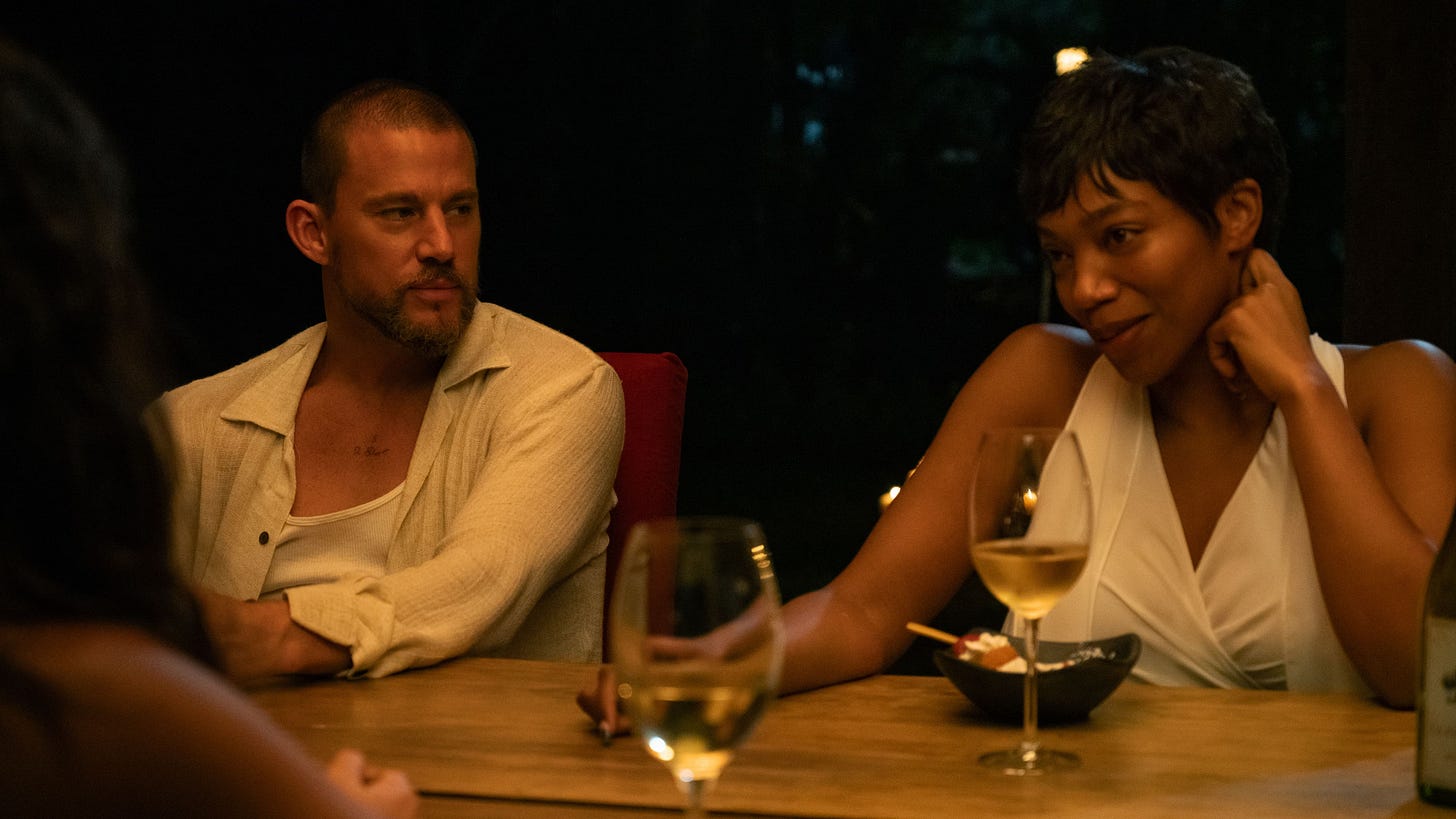Blink Twice Won't Soon Be Forgotten
Zoë Kravitz’s directorial debut interrogates forgiveness.
You never quite know what you’re going to get with first-time directors, especially those who make the jump from acting to directing. Is their first film in the driver’s seat the result of their skill, passion, and understanding of the craft? Or the result of relatively unbridled access to studio funds?
Zoë Kravitz’s writing and directorial debut Blink Twice firmly puts her in the first of those two categories, a smart and empathetic commentary on sexual assault and patriarchal dominance in the format of a finely crafted psychological thriller.
A Masterful Tonal Cacophony
When tech billionaire Slater King (Channing Tatum) meets cocktail waitress Frida (Naomi Ackie) at his fundraising gala, sparks fly. He invites her to join him and his friends on a dream vacation on his private island. It’s paradise. Wild nights blend into sun soaked days and everyone's having a great time. No one wants this trip to end, but as strange things start to happen, Frida begins to question her reality. There is something wrong with this place. She’ll have to uncover the truth if she wants to make it out of this party alive.

Blink Twice is a cacophony of wild tonal shifts that would challenge even seasoned directors, but Kravitz handles them with ease. At any given moment, I found myself either laughing or feeling a pit in my stomach—sometimes even both at once. And these disparate emotions only mix further in the film’s hectic third act where we see certain characters put on a mask of happiness to hide their true terror.
In building up to the craze of the third act, the film’s first two acts employ slow, deliberate camera movements mixed with shocking and effective smash cuts to create a constant sense of unease, accompanied by a soundtrack that is equal parts fun and foreboding.
Thanks to both Kravitz’s clever writing and clear direction, repeated moments and visual cues carry different meanings as the film goes on. A fun prank involving a missing lighter feels more worrisome and sinister the second and third and fourth time it occurs. The first act’s flirtatious rapport between couples feels like a terrifying game of cat and mouse by the third act. Kravitz’s sure hand guides the audience to feel varying emotions each time these events occur, furthering the film’s slow descent into madness. Much like the cast, the audience only recognizes the darkness behind these actions when it’s nearly too late.
Speaking of which, the cast is a unique assembly of recognizable faces (led by Channing Tatum and Naomi Ackie) and relative unknowns, but their combined chemistry as a group is where the film truly shines. The men’s easy camaraderie, the women’s quick bonding, and the flirtatious conversations all feel so natural, immediately clueing us in as viewers to the various dynamics at play among them.

That’s not to say the film is without its flaws. While the screenplay thrives in building tension and offering thematic depth, it does so at the expense of character depth and development. We’re offered mere facades of the characters at play in the film, with even Frida our protagonist given only a thin backstory and motivation. While this underdevelopment can be partially attributed to shocking revelations later in the film (and perhaps even works within the film’s themes), it also keeps the viewer at arm’s length for far too long. We aren’t getting to know any of the characters, which, until the end, makes it much harder to root for or against any of the characters.
Do I Forgive, or Forget?
Slight spoilers in this section.
During a pivotal third act moment, Channing Tatum’s character Slater reveals his life philosophy: “There’s no such thing as forgiveness. There’s just forgetting.” This simple quote reveals everything we need to know about the motivation behind his actions. I couldn’t help but laugh at this flimsy excuse for continued abuse, easily countered by Paul’s words to the Romans.
But the sad truth is, both within the film and within the larger context of sexual violence in our society, we see the ways in which victims, perpetrators, and onlookers alike all too often choose the route of ignoring, suppressing, or “forgetting” unspeakable acts. It’s often easier. It’s often simpler.

And Slater isn’t entirely wrong in his assertion either. Such simple forgiveness (“I’m sorry,” “I forgive you”) is a nigh impossible fantasy, particularly after someone has committed such hateful and atrocious actions. But as a Christian, this quote immediately drew my attention, because forgiveness is such a key part of my faith and what makes God’s justice, love, and mercy so much better than our human capabilities.
In fact, some might say that in Christianity forgetting follows forgiveness. It is an act of grace that is intentional, signifying that God chooses to not hold past sins against those He forgives.
“I am he who wipes away your sins because of who I am. And so, I will forget the wrongs you have done.”
- Isaiah 43:25
But God’s forgiveness isn’t a matter of glossing over wrongdoings. He had to engage with humanity’s sin problem directly, with Christ’s sacrifice – dying to pay the price for our sins – the only possible means of redemption and forgiveness. This forgiveness comes too with an imperative for us: go and sin no more. This serves as a stark contrast to the film, where Slater continues his life of sin and abuse.
I won’t pretend that forgiving sexual abuse is the catch-all answer here. The Bible commands us to both aid the vulnerable and to call out sin and abuse, and Blink Twice even opens with a content warning providing resources for sexual violence. But in a film that grapples with our capability as humans to forgive, it’s humbling to remember I serve a God who isn’t just capable of forgiveness, but who gifted me the ultimate act of forgiveness.

Conclusion
Blink Twice may not dig as deep into its characters or themes as some may have hoped. But it is an impressive directorial debut that smartly uses its cast and crew to build tension and share an important message on sexual violence and our capacity for forgiveness. I was on the edge of my seat every step of the way, and I can’t wait to see what Zoë Kravitz does next. Check this film out while it’s still in theaters!


